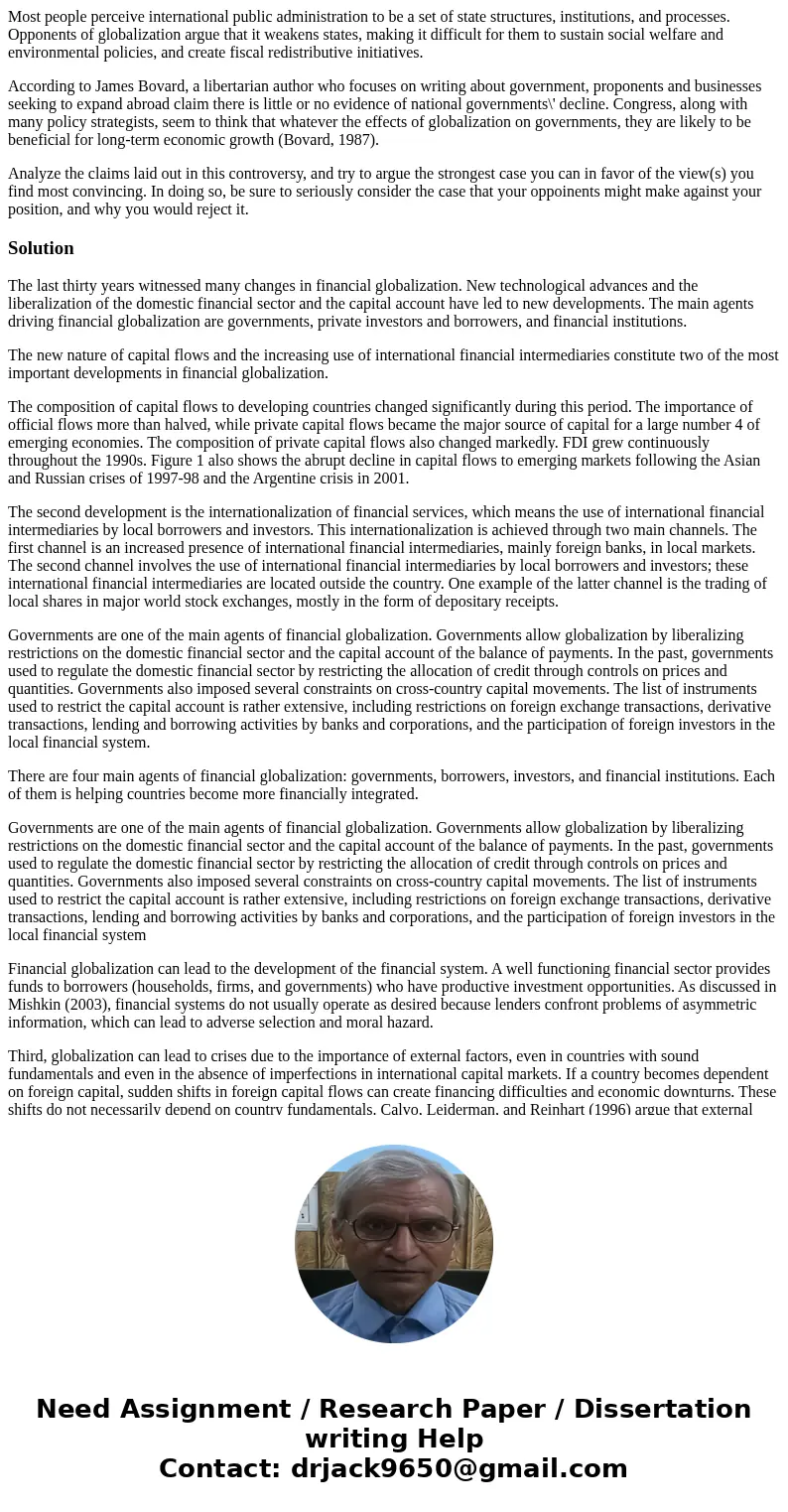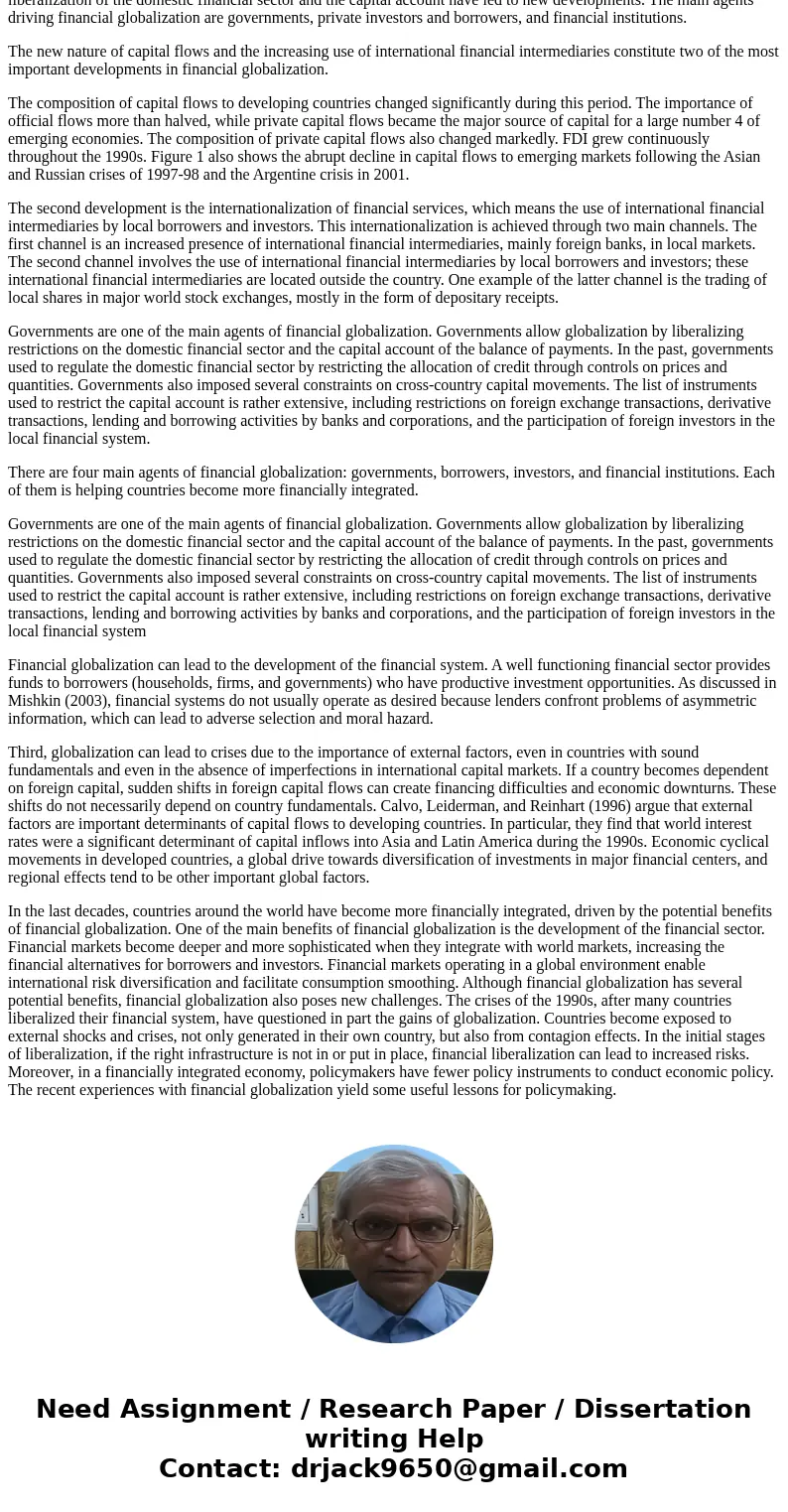Most people perceive international public administration to
Most people perceive international public administration to be a set of state structures, institutions, and processes. Opponents of globalization argue that it weakens states, making it difficult for them to sustain social welfare and environmental policies, and create fiscal redistributive initiatives.
According to James Bovard, a libertarian author who focuses on writing about government, proponents and businesses seeking to expand abroad claim there is little or no evidence of national governments\' decline. Congress, along with many policy strategists, seem to think that whatever the effects of globalization on governments, they are likely to be beneficial for long-term economic growth (Bovard, 1987).
Analyze the claims laid out in this controversy, and try to argue the strongest case you can in favor of the view(s) you find most convincing. In doing so, be sure to seriously consider the case that your oppoinents might make against your position, and why you would reject it.
Solution
The last thirty years witnessed many changes in financial globalization. New technological advances and the liberalization of the domestic financial sector and the capital account have led to new developments. The main agents driving financial globalization are governments, private investors and borrowers, and financial institutions.
The new nature of capital flows and the increasing use of international financial intermediaries constitute two of the most important developments in financial globalization.
The composition of capital flows to developing countries changed significantly during this period. The importance of official flows more than halved, while private capital flows became the major source of capital for a large number 4 of emerging economies. The composition of private capital flows also changed markedly. FDI grew continuously throughout the 1990s. Figure 1 also shows the abrupt decline in capital flows to emerging markets following the Asian and Russian crises of 1997-98 and the Argentine crisis in 2001.
The second development is the internationalization of financial services, which means the use of international financial intermediaries by local borrowers and investors. This internationalization is achieved through two main channels. The first channel is an increased presence of international financial intermediaries, mainly foreign banks, in local markets. The second channel involves the use of international financial intermediaries by local borrowers and investors; these international financial intermediaries are located outside the country. One example of the latter channel is the trading of local shares in major world stock exchanges, mostly in the form of depositary receipts.
Governments are one of the main agents of financial globalization. Governments allow globalization by liberalizing restrictions on the domestic financial sector and the capital account of the balance of payments. In the past, governments used to regulate the domestic financial sector by restricting the allocation of credit through controls on prices and quantities. Governments also imposed several constraints on cross-country capital movements. The list of instruments used to restrict the capital account is rather extensive, including restrictions on foreign exchange transactions, derivative transactions, lending and borrowing activities by banks and corporations, and the participation of foreign investors in the local financial system.
There are four main agents of financial globalization: governments, borrowers, investors, and financial institutions. Each of them is helping countries become more financially integrated.
Governments are one of the main agents of financial globalization. Governments allow globalization by liberalizing restrictions on the domestic financial sector and the capital account of the balance of payments. In the past, governments used to regulate the domestic financial sector by restricting the allocation of credit through controls on prices and quantities. Governments also imposed several constraints on cross-country capital movements. The list of instruments used to restrict the capital account is rather extensive, including restrictions on foreign exchange transactions, derivative transactions, lending and borrowing activities by banks and corporations, and the participation of foreign investors in the local financial system
Financial globalization can lead to the development of the financial system. A well functioning financial sector provides funds to borrowers (households, firms, and governments) who have productive investment opportunities. As discussed in Mishkin (2003), financial systems do not usually operate as desired because lenders confront problems of asymmetric information, which can lead to adverse selection and moral hazard.
Third, globalization can lead to crises due to the importance of external factors, even in countries with sound fundamentals and even in the absence of imperfections in international capital markets. If a country becomes dependent on foreign capital, sudden shifts in foreign capital flows can create financing difficulties and economic downturns. These shifts do not necessarily depend on country fundamentals. Calvo, Leiderman, and Reinhart (1996) argue that external factors are important determinants of capital flows to developing countries. In particular, they find that world interest rates were a significant determinant of capital inflows into Asia and Latin America during the 1990s. Economic cyclical movements in developed countries, a global drive towards diversification of investments in major financial centers, and regional effects tend to be other important global factors.
In the last decades, countries around the world have become more financially integrated, driven by the potential benefits of financial globalization. One of the main benefits of financial globalization is the development of the financial sector. Financial markets become deeper and more sophisticated when they integrate with world markets, increasing the financial alternatives for borrowers and investors. Financial markets operating in a global environment enable international risk diversification and facilitate consumption smoothing. Although financial globalization has several potential benefits, financial globalization also poses new challenges. The crises of the 1990s, after many countries liberalized their financial system, have questioned in part the gains of globalization. Countries become exposed to external shocks and crises, not only generated in their own country, but also from contagion effects. In the initial stages of liberalization, if the right infrastructure is not in or put in place, financial liberalization can lead to increased risks. Moreover, in a financially integrated economy, policymakers have fewer policy instruments to conduct economic policy. The recent experiences with financial globalization yield some useful lessons for policymaking.


 Homework Sourse
Homework Sourse